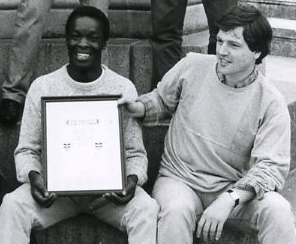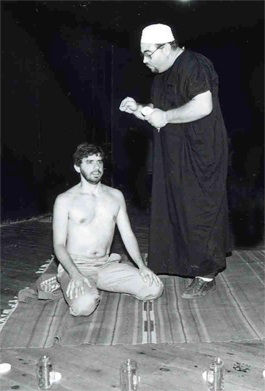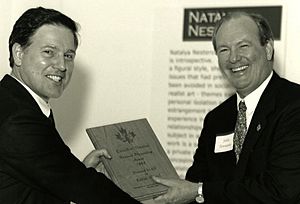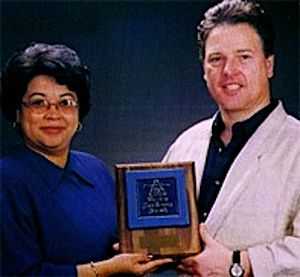Karim Alrawi facts for kids
Quick facts for kids
Karim Alrawi
|
|
|---|---|
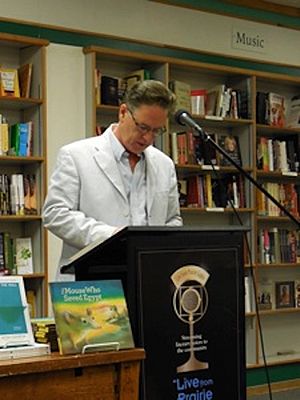
Reading at Prairie Lights bookstore, Iowa City, Iowa, 2016
|
|
| Born | 1952 Alexandria, Egypt |
| Occupation | Writer, playwright |
| Genre | Literary Fiction, Children's fiction, Plays for stage, radio and television |
| Notable works | Migrations, Child in the Heart, Promised Land, The Unbroken Heart, Deep Cut, Madinat al-Salam |
Karim Alrawi (Arabic: كريم الراوي) is a writer who was born in Alexandria, Egypt. He has taught at universities in many places, including the UK, Egypt, the US, and Canada. He was a special writing fellow at the University of Iowa and taught creative writing there.
Karim Alrawi has always been active in working for peace and human rights. In the UK, he wrote for groups that fought against racism. He also spoke at important conferences about fighting racism. He has supported the idea of a Palestinian state for a long time. In 2003, he spoke to the US Congress. He talked about how important it is to support groups that help people and independent news in the Middle East and North Africa. He also helped plan for a two-state solution between Israel and Palestine.
In Egypt, he worked for the Egyptian Organization for Human Rights. He was also the president of the Egyptian branch of International Pen, which is a group for writers. He held this position from 1992 to 1994.
He was in Egypt during the Arab Spring uprisings from 2011 to 2013. After the military took control again, Alrawi was among many human rights activists who faced charges. These charges were about him training journalists in media ethics and using the internet. Some people thought this helped cause the 2011 uprising. However, an Egyptian court dismissed these charges on December 20, 2018. This decision was confirmed by a higher court on December 4, 2020. On March 20, 2024, an investigative judge officially closed the case.
Contents
About Karim Alrawi
Karim Alrawi studied at University College London, the University of Manchester, and the University of British Columbia.
In the UK, he was a Literary Manager at the Theatre Royal Stratford East. He was also a Resident Writer at the Royal Court Theatre in London. He helped decide which plays received funding from the Arts Council of Great Britain. When he returned to Egypt, he taught at the American University in Cairo. His plays were sometimes not allowed by the government. He faced difficulties for his work with the Egyptian Organization for Human Rights. In 1993, he was supported by the Egyptian Organization for Human Rights after some groups criticized his work.
He later went to the United States as a Fulbright International Scholar. He worked with many theaters there, including Meadow Brook Theatre in Michigan and the Oregon Shakespeare Festival. He also worked at the Kennedy Centre in Washington, DC, and LaMama in New York. He has written and edited several international publications. He was the Editor in Chief of ARABICA magazine. This was a popular Arab-American publication. He also helped manage media training programs in North Africa and South Asia. He was a member of the Canadian team that worked on good governance in the Arab World. He also advised the World Bank on communications for the Middle East and North Africa.
Awards and Recognition
Karim Alrawi's stories, plays, and productions have won many awards. These include:
- The HarperCollins Publishers Prize for Best New Fiction, Canada.
- The Wallace Stegner Award for the Arts, Canada.
- The John Whiting Award, for his special contributions to theater in the UK.
- The Samuel Beckett Award, for new and excellent writing for performances in the UK.
- Edinburgh Festival Fringe First Award, for an outstanding new play in the UK.
- Festival of Asia Writer's Award, for a promising new playwright in the UK.
- He won the Egyptian Ministry of Culture Theatre and Youth Award twice in Egypt.
- Jessie Richardson Theatre Award, Canada.
- National Playwriting Award, Canada.
- USA Plays Today Award, USA.
- The Free Press Theatre Excellence Award, Michigan, USA.
He has also received writing awards from the Arts Council of Great Britain and the Canada Council for the Arts.
His Plays
Karim Alrawi has written many plays for different theaters around the world.
Plays in Britain
His first full-length play, Migrations, was shown at the Theatre Royal Stratford East. His second play, A Colder Climate, was performed at the Royal Court Theatre in London. He then wrote three more plays for Joint Stock Theatre: Fire in the Lake, A Child in the Heart, and Promised Land. These plays were very popular at the time. Fire in the Lake won an Edinburgh Fringe First Award. Another play, Crossing the Water, was about the British in Egypt and the Suez War. It was performed at the American University in Cairo.
Alrawi's play Blind Edge was shown at the Commonwealth Institute in London. His play Aliens won a national playwriting award. He wrote plays for many famous theaters in the UK, like the Royal Court Theatre, Theatre Royal Stratford East, and the Old Vic Theatre.
Plays in Arabic
In Egypt, Alrawi taught theater at the American University in Cairo (AUC). His play Crossing the Water was not allowed by the government. As a response, he adapted a famous play called The Three Sisters and set it in modern Egypt. He also wrote four plays in Arabic. Two of them were performed at the Wallace Theatre. Madinate el Salam (City of Peace) tells the story of a Sufi poet named Mansour al-Hallaj. This play was performed twice, even though the government did not give permission. Another play, Al-Bayt al Mahgour (The Abandoned House), was about social issues in Egypt. These plays led to difficulties for Alrawi.
Two other plays, Autobis al Intikhabat (The Election Bus) and Mudun Gha'iba (Absent Cities), were planned to be performed by students from AUC. However, the performances were canceled.
Plays in North America
Karim Alrawi was a writer-in-residence at several places in North America. These included Iowa State University and the Oregon Shakespeare Festival. He taught playwriting at the University of Victoria in Canada. He also taught creative writing at the University of Iowa.
His play The Unbroken Heart was based on the life of blues singer Ethel Waters. It was first performed in Iowa and then toured across the country. He wrote other plays for Meadow Brook Theatre, such as A Gift of Glory about artist Diego Rivera. He also wrote Chagall's Arabian Nights and Killing Time. He wrote plays for local schools and led theater workshops for children.
His play Sarajevo was about the Bosnian war. The play Sugar Candy was read at the Mixed Blood Theatre.
Patagonia, a play about standing up for what's right, was first performed in Vancouver, Canada. Across The Morne was a play set in Newfoundland.
Deep Cut, a play about cultural differences, was performed at La MaMa ETC in New York. It was also shown in San Francisco and Washington, DC.
Children's Books
Alrawi has written two picture books for children: The Girl Who Lost Her Smile and The Mouse Who Saved Egypt.
The Girl Who Lost Her Smile won the Parents Magazine Gold Award in 2002. It was also a finalist for the Kentucky Bluegrass Book Award in 2002. This book was turned into a children's play in the UK and the United States.
His picture book The Mouse Who Saved Egypt was considered for the People's Prize in the UK.
He also wrote a children's cookbook called Arab Fairytale Feast. It was shortlisted for the Forest of Reading Children's Books Awards in 2023.
Books for Adults
Alrawi's novel Book of Sands was published in 2015. It won the first HarperCollins Publishers Prize for Best New Fiction. It was also named a Canadian Broadcasting Corporation Best Book of the year. It was a finalist for the Amazon Best New Fiction award.
Other Creative Works
Karim Alrawi has also written for BBC radio and television. He has also written for Channel 4 television in the UK.


